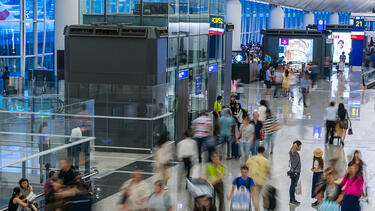Three Questions: Prof. Edieal Pinker on Holiday Travel
At the holidays, a surge of airline passengers means long lines and crowded overhead compartments. Yale’s Edieal Pinker is an expert on operations research, which uses mathematics to streamline industrial processes. We asked him if there’s any hope for making airline travel less unpleasant.

Photo: ymgerman/Shutterstock.com
The most frustrating part of holiday travel may be when things don’t work the way they’re supposed to. For example, sometimes TSA Pre members end up waiting longer than people who haven’t completed the pre-screening. Why might this happen? Are there ways to speed up security lines?
Because pre-check changes the security procedures (e.g., shoes on versus shoes off), it requires dedicated screening lanes. This means that service capacity is being reserved for a sub-group of passengers at the expense of the others. If the passenger volume is not too high, it is possible to give pre-check passengers preferential treatment without imposing a large delay on the regular passengers. But during the holiday travel season the transportation system is maxed out. Reserving too many screening lanes for pre-check would be a disaster, so you might reduce the number of pre-check lanes. But because screening lanes cannot be subdivided into fractions, you may end up making waits significantly longer for the pre-check passengers.
For the TSA managers, this is a difficult balancing act under high-stress conditions. Short of new technologies that enable people and carry-on bags to be scanned more quickly, there is no way to speed the security lines. What is most important is to make sure that all the equipment is functioning and fully staffed during peak load periods. One mistimed break or breakdown can wreak havoc. I would also propose creating an express line for people who are not carrying a lot of bags. They should be able to breeze through and not have to wait for the families in which every child has an iPad and beverage in hand. “Shortest job first” is a priority scheme known to reduce overall waiting in many settings.
Once you get through the security lines, you have to wait to board your plane. Different airlines take very different approaches to getting people into the airplane; for instance, British Airways is now boarding flyers based on the price of their ticket. Why hasn’t this problem been solved yet?
This problem actually has many solutions that vary across airlines, and they all stink. No one has a good way to do this. The airplane may look like a sausage casing but unfortunately the passengers are not ground meat that can be squeezed into the fuselage! The main problem is the carry-on luggage, which slows everyone down and is a direct result of the checked baggage fees. The best ideas for boarding schemes involve spacing the passengers out so that they are less likely to interfere with each other. I would send passengers onto the plane in small groups that can quickly flow through the plane to their seats before the next group arrives. British Airways just wants to save their high-pay customers the aggravation.
What advice do you have for the holiday traveler likely to encounter long lines?
Pack a snack. You are sure to be waiting. At least if you aren’t hungry, you will be less grumpy and kinder to others. Bon voyage!